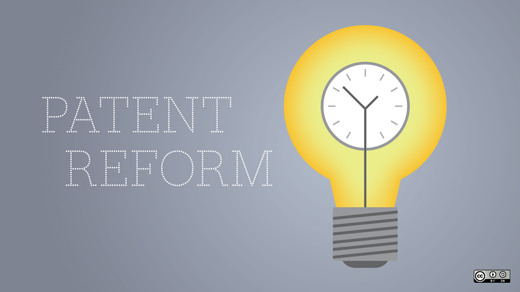In the latest evidence of the growing recognition that our patent system needs reform, last week the House Subcommittee on Courts, Intellectual Property, and the Internet held an informative and well-attended hearing on "Abusive Patent Litigation".
House Judiciary Committee Chairman Bob Goodlatte set the tone for the hearing:
Abusive patent litigation is a drag on our economy. Everyone from independent inventors, to start-ups, to mid and large sized businesses face this constant threat. The tens of billions of dollars spent on settlements and litigation expenses associated with abusive patent suits represent truly wasted capital – wasted capital that could have been used to create new jobs, fund R&D, and create new innovations and technologies that would “promote the progress of science and useful arts.”
<snip>
PAEs [Patent Assertion Entities] often times acquire weak or poorly-granted patents, and proceed to send blanket demand letters or file numerous patent infringement lawsuits against American businesses with the hopes of securing a quick payday.
Many of these PAEs file lawsuits against small and medium-sized businesses, targeting a settlement just under what it would cost for litigation, knowing that these businesses will want to avoid costly litigation and probably pay up.
PAE lawsuits claim ownership over basic ideas, such as sending a photocopy to email, podcasting, aggregating news articles, offering free Wi-Fi in your shop, or using a "shopping cart" on your website – something is terribly wrong here.
The patent system was never intended to be a playground for trial lawyers and frivolous claims. We need to work on reforms to discourage frivolous patent litigation and keep U.S. patent laws up to date. Abusive patent troll litigation strikes at the very heart of American innovation and job creation. That is why Congress, the Federal Courts and the PTO [U.S. Patent and Trademark Office] should continue to take the necessary steps to ensure that the patent system lives up to its Constitutional underpinnings.
While there were a few voices on the Committee, and at least one witness, who defended the current system, there was a remarkable common thread at the hearing: The America Invents Act went just so far, and that Congress, the Courts and the USPTO need to continue to engage to reduce the impact of bad patents (particularly software patents) and reduce the incentives for so-called ‘patent trolls’ to benefit from the current flaws in the system.
I was particularly struck by the testimony of Janet L. Dhillon, Executive Vice President, General Counsel of retailer jcpenney. When she joined the company 4-years ago, jcpenney had no patent cases. Since that time, however,"the company has had to defend or settle over two-dozen patent infringement lawsuits that have nothing to do with the products jcpenney actually sells. Keep in mind this number does not include those claims that are settled upon receipt of demand letters."
What has jcpenney been sued for? Essentially, using many of the technological tools that have enabled it to be an Internet retailer and responding to customers who are using new avenues for buying: "[W]e have been sued for displaying catalog images and having drop down menus on our website, activating a gift card at the point of sale, browsing a website on a mobile phone or enabling a customer to put her purchases in an electronic shopping bag or cart. We have been subjected to multiple claims for providing information regarding our store locations to a mobile phone."
What is worse, according to Ms. Dhillon, is that "[t]hese patents date back to the late 80’s and early to mid-90’s and all have had multiple owners with minimal or no continuing involvement of the actual inventor. ... Defending suits against broadly asserted patents that are 15 to 25 years old is very difficult. Trolls know the evidence necessary to invalidate these patents has often been destroyed, potential witnesses have died or memories have faded, which makes reconstructing the prior art and proving the patent invalid almost impossible and extremely expensive.
There were also thoughtful statements and insights given by Cisco General Counsel Mark Chandler, SAS Institute’s General Counsel John G. Boswell, and Adobe’s VP for IP Litigation Dana Rao. They certainly did not agree on each and every aspect of the discussion or solution, but all indicated that there needs to be further reform of the system.
Plenty of references were made to the recently reintroduced bi-partisan SHIELD Act, which could make it easier for companies to recover money spent defending against frivolous troll suits. Late last week, the Electronic Frontier Foundation reported that over 13,000 individuals have contacted Congress to voice their support for the legislation.
Chairman Goodlatte is to be especially commended for drawing a key connection between troll suits and the poor quality, vague and overbroad patents that they use to sue on. This characterizes, especially, the situation with software patents.
In fact, software patents are the subject of a disproportionate share of patent litigations. Over half (55%) of all patent defendants and 82% of PAE defendants are there because of a software patent, many of which are vague, overbroad and likely to be invalid. Suits brought by PAEs now account for over 60% of all patent litigation.
It appears quite likely that some kind of patent bill will be seriously considered in the House and/or Senate. What that bill will include remains uncertain at the moment. Regardless, it is clear that policy makers are hearing more and growing concerns with patent litigation abuse, and particularly with software patents.
As President Obama pointed out in February, the patent reform legislation Congress passed several years ago hasn't "captured all the problems" and the bill "only went about halfway to where we need to go."
"[Patent trolls] are a classic example. They don't actually produce anything themselves," the President said. "They're just trying to essentially leverage and hijack somebody else's idea and see if they can extort some money out of them."
It is important to keep contacting policy makers on this important issue. If you haven’t done so, let the members of the Judiciary Committee in both the House and Senate hear from you. Your voice is important and can make a difference.







3 Comments